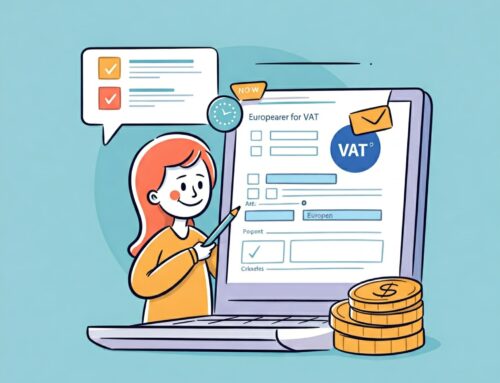This article has been written after the the substantial change in VAT regulation of July 2021.
Welcome to our comprehensive guide for businesses on accounting in EU. As a European Union member, businesses are subject to a variety of accountancy rules and regulations that can be complex and overwhelming. In this article, we will provide a detailed overview of the different aspects of accounting in EU. From accountancy rules for small businesses and micro enterprises to company tax rules and financial reporting requirements, we will cover everything you need to know to ensure your business is compliant with EU regulations. So, whether you are a small startup or a large corporation, read on to learn more about the importance of accounting in EU.
EU Accountancy Rules for Businesses
In order to operate in the European Union, it is imperative to be familiar with the regulations established for business accountancy. These regulations supervise the preparation and presentation of fiscal statements, advancing clarity and exactness in financial communication. The regulations are established to encourage uniformity and similarity of fiscal data throughout the region, making it simpler for businesses to be a part of the global network.
Adhering to these rules is vital for businesses running in the EU, and non-compliance may result in penalties or legal action. The EU accountancy rules for businesses encompass a variety of areas, including accounting methods, fiscal reporting requirements, and disclosure obligations. It is crucial for businesses to keep up-to-date with any alterations or updates to these rules, as they can have a considerable effect on fiscal communication and general business operations. By following these rules, businesses can ensure the authenticity of their fiscal communication and preserve the confidence of stakeholders in the global network.
For specific or concrete queries on accounting, ask our free online accounting consultant.
Financial and Non-Financial Reporting Requirements
Businesses operating within the European Union must comply with strict regulations regarding reporting both financial and non-financial matters. These rules are designed to ensure transparency and to provide stakeholders with up-to-date information about the firm’s fiscal health. Financial statements must be produced in accordance with International Financial Reporting Standards (IFRS). Additionally, companies are now being asked to report on environmental, social, and governance (ESG) issues.
To help ensure compliance, the EU Non-Financial Reporting Directive was established in 2014. This directive was recently revised to encompass a greater number of businesses and to require more exhaustive reporting. This directive is intended to promote responsible business practices and to increase accountability.
Furthermore, banks and other financial institutions must abide by the European Banking Authority’s (EBA) regulations regarding their capital adequacy, liquidity, and risk management strategies. These reports are essential in monitoring the health of the financial sector and in recognizing potential dangers to economic stability.
To sum up, financial and non-financial reporting requirements are imperative for ensuring businesses are answerable to their stakeholders and that they conduct their operations in a sustainable and conscientious manner. Though these requirements may seem burdensome, they ultimately help to foster openness and trust between businesses and their stakeholders. Moreover, the various member states of the EU are obligated to uphold these regulations.
Company Tax Rules in the EU
When it comes to corporate taxation, European companies must adhere to a wide range of rules and regulations. This includes everything from income tax to value-added tax (VAT), and each member state may have its own set of requirements. Therefore, businesses need to be cognizant of the local tax laws and any cross-border issues that may arise. Failing to comply with these can lead to serious financial and legal repercussions.
In order to be in line with the EU’s company tax rules, businesses must regularly submit comprehensive financial statements. These documents provide an in-depth look at the company’s assets, liabilities, revenues, and expenses, and can be used by investors, lenders, and other stakeholders to evaluate the firm’s performance. Additionally, financial statements are often a requirement of regulatory bodies and tax authorities.
Another essential concept in the EU’s corporate tax framework is transfer pricing. This involves the setting of prices for goods and services that are traded within the same company. To make sure that profits are not artificially shifted to low-tax jurisdictions, the European Union has established a series of regulations that stipulate how transfer prices are to be determined. Specifically, these rules ensure that the prices reflect the true value of the goods or services being exchanged.
Excise Duties in the EU and National Rules
When it comes to taxation in Europe, levies on goods such as alcohol, tobacco, and energy are an integral part. Companies must adhere to both European-wide and national regulations when producing or importing these items into the EU. The rate of taxation depends on the type of product and the country in which it is sold. To remain in compliance and competitive, businesses must stay abreast of such rules.
In addition to compliance to European regulations, companies must also observe the individual country’s regulations regarding excise duties. This includes registering for such taxes, providing regular reports, and paying the correct amounts. Neglecting to do so may result in financial penalties or legal action.
Further, it is essential for businesses to understand the impact of taxation on their overall operations. VAT, excise duties, and other taxes can have a considerable effect on pricing and profitability. To navigate such costs, companies may need to adjust pricing, seek exemptions or reductions, or look for new markets such as the United States. The EU furnishes resources to help businesses understand the relevant laws and regulations.
Ultimately, staying abreast of European regulations and understanding the implications of taxation are important for companies operating in the EU to remain competitive. With the help of the EU’s resources, businesses can find the most suitable strategies to manage these costs.
Annual Accounts Rules
The purpose of Annual Accounts Regulations is to guarantee that companies in the European Union illustrate a precise and honest portrayal of their financial conditions, results and money flows in their yearly financial records. These standards, in agreement with the pertinent legal stipulations and accounting regulations, guarantee that both big and small businesses adhere to the same high standards of financial reporting, encouraging openness and responsibility in the EU business landscape. Member states of the EU have specified requirements for annual accounts, involving the balance sheet, income statement, and cash flow statement, which must be produced and submitted on a yearly basis.
The International Financial Reporting Standards (IFRS) endorsed by the European Union offer a common language for financial reporting across the EU, facilitating businesses to work in multiple member states. These guidelines provide a useful framework for investors, lenders, and other stakeholders to make informed judgements about a company’s financial performance. Consequently, Annual Accounts Rules are crucial to the accounting process for businesses functioning in the European Union.
Accounting Rules for Small Businesses and Micro Enterprises
Small businesses and micro enterprises play an important role in the European economy, yet they often lack the resources to hire a dedicated accounting team. Consequently, suitable accounting regulations are critical for these enterprises’ survival and development. To this end, the simplified accounting scheme offers a solution: allowing these businesses to adopt simpler methods and pay lower taxes, and in some cases providing exemption from financial reporting. However, those who choose this option must keep track of their income and expenses, including invoices, receipts, and bank statements. All in all, these accounting rules strive to reduce the administrative burden on small companies and micro enterprises while protecting the accuracy of financial reporting.
Therefore, it is clear that the simplified accounting regime is beneficial for those operating small businesses and micro enterprises. Not only does it facilitate lower taxes and fewer requirements, but it also guarantees the proper filing of financial statements. This is especially advantageous for those who may not have the capacity to hire a dedicated accounting team. All things considered, the simplified accounting scheme serves as an invaluable resource for small businesses and micro enterprises in the EU.
International Accountancy Standards
Guaranteeing that enterprises within the European Union are functioning with a high level of transparency and responsibility is a job for international standards of accountancy. These standards provide a unified language for financial reporting, making it easier for firms to communicate with stakeholders from all areas of the globe. By conforming to these standards, companies can upgrade the accuracy of their financial reporting and minimize the possibility of mistakes and disparities. This is highly important for companies that have activities in multiple countries and need to present consolidated financial statements.
One of the major advantages of international accountancy standards is that they give a framework for consistent financial reporting. This assures that businesses are offering investors with dependable and exact data, which is fundamental for taking informed investment decisions. By following these standards, businesses can also enhance their status and reliability, which can help draw in new investors and bolster long-term growth.
International accountancy standards are also pivotal for making sure that companies are conforming to related regulations and laws. These standards provide direction on how to make financial statements that abide by both local and international laws, which can help firms evade legal and financial punishments. For instance, businesses that neglect to follow EU accountancy rules can be subjected to fines or legal action.
Ultimately, international accountancy standards are indispensable for furthering economic stability and transparency across the world. By adopting these standards, businesses can assist in preventing financial crises and fostering economic development. This is particularly relevant for companies in the banking and financial sector, which are subjected to stringent accounting and disclosure regulations set by the European Banking Authority (EBA).
Importance of Appropriate Accounting Information for Small Enterprises and Stakeholders
Small businesses and micro-enterprises compose nearly all of the commercial activity in the European Union. These enterprises are vital to the economy and a crucial source of job creation and economic growth. For this reason, it is important for small firms to have access to appropriate information. The European Commission has taken into account the unique needs of small firms and implemented accounting regulations tailored to them.
It is essential for small companies to keep accurate and up-to-date records. This data is vital for making informed decisions, managing cash flow, and fulfilling tax responsibilities. If the information is not accurate, it can lead to incorrect choices with serious consequences. On the other hand, providing accurate information to stakeholders is also important for gaining their trust and credibility.
The European Commission has launched a project to analyze different accounting systems for small enterprises. The main goal of this project is to identify both the advantages and disadvantages of various systems and to help small firms choose the right one. In addition, it is intended to encourage the use of high-quality accounting standards among small firms. The European Banking Authority also promotes sound accounting and disclosure standards for the banking and financial sector. Therefore, small enterprises should strive to meet high standards of accounting information to show their reliability and openness to stakeholders.
Project to Analyze Various Accounting Systems for Small Enterprises
Small enterprises are a critical component of the European Union’s economy, taking up 99% of all businesses. Despite this, the methods used to manage their finances differ greatly, from manual bookkeeping to advanced software. The Project to Analyze Various Accounting Systems for Small Enterprises seeks to identify the most efficacious accounting systems for small firms in the union. By examining these systems, the project hopes to provide direction on how small enterprises can upgrade their accounting processes and facilitate their financial reporting procedures.
One of the troubles confronting small businesses in the EU is the deficiency of uniformity in accounting systems. The Project to Analyze Various Accounting Systems for Small Enterprises attempts to address this issue by discovering effective practices and constructing standards that can be embraced by small enterprises across the EU. By levelling out accounting practices, small businesses can benefit from improved clarity, enhanced financial reporting, and heightened access to financial resources.
The Project to Analyze Various Accounting Systems for Small Enterprises will involve a comprehensive review of existing accounting systems used by small businesses in the EU. This review will incorporate an analysis of the strengths and weaknesses of each system, as well as an assessment of their suitability for various types of small businesses. The project will also gauge the practicability of deploying new accounting systems that can boost financial reporting and simplify accounting processes for small enterprises in the EU.
The outcomes of the Project to Analyze Various Accounting Systems for Small Enterprises will be of immense worth to small businesses, policymakers, and stakeholders in the EU. By pinpointing the most effective accounting systems for small enterprises, the project can help to advance greater financial soundness, transparency, and efficacy in the union. This, in turn, can lead to increased investment, job generation, and economic growth across the European Union.
EBA Promotes Sound and High-Quality Accounting and Disclosure Standards for Banking and Financial Industry
The European Banking Authority (EBA) recognizes the significance of reliable and superior disclosure standards for the banking and financial industry. To guarantee clarity and responsibility, the EBA has implemented regulations to guarantee that accounting practices in the EU are in line with global standards, and all companies must adhere to these principles to guarantee the reliability of their financial reporting. The EBA’s attempts to promote sound accounting practices have aided in increasing assurance in the banking and financial industry, which is vital for enterprises to succeed in the EU.
The EBA’s labor is fundamental to guaranteeing that the accounting practices in the EU are clear, dependable, and consistent. By endorsing sound accounting practices, the EBA helps businesses to precisely report their financial information, which is essential for making well-informed business decisions. The EBA’s efforts have also aided in harmonizing EU accounting standards with international accounting standards, making it easier for businesses to work across borders.
The EBA’s regulations cover a wide range of accounting practices, including financial reporting, auditing, and disclosure. These regulations target guaranteeing that businesses in the EU follow best practices when it comes to accounting, providing transparency and liability in their financial reporting. The EBA’s endeavors to promote sound accounting practices have been instrumental in constructing faith in the banking and financial industry, which is essential to drawing in investors and maintaining a stable financial market.
To summarise, the EBA’s attempts to boost reliable and superior disclosure standards for the banking and financial industry are a vital aspect of the EU’s accounting regulations. By making sure that businesses adhere to best practices when it comes to accounting, the EBA encourages transparency and accountability, which is essential for building trust in the financial market. For enterprises working in the EU, adhering to the EBA’s regulations is essential for maintaining the reliability of their financial reporting and guaranteeing their long-term success in the accounting business.
Guide for Completing VAT Return for Different Types of Transactions
Handling VAT filings can be a complex and overwhelming process for businesses. To make sure you are in compliance with EU law, it is essential to understand the regulations associated with different types of transactions. Whether you are a small business or a large corporation, it is vital to be aware of the rules and ensure that your filings are accurate and timely.
A key part of completing VAT returns is understanding the different types of transactions that are subject to VAT. These can include sales of goods and services, imports and exports, and intra-community supplies. Each of these transactions has its own specific rules and regulations.
In addition to understanding the different types of transactions, it is also important to keep accurate records of all your transactions. This includes invoices, receipts, and other relevant documents. Keeping these records up-to-date and organized is essential for being able to track your transactions and ensure that your VAT returns are accurate. It is also important to keep these records for a period of at least 10 years, as tax authorities may request them for auditing purposes.
Conclusion
In conclusion, accounting is a critical aspect of running a successful business in the European Union. It is essential to comply with the EU accountancy rules, financial and non-financial reporting requirements, company tax rules, excise duties, and annual accounts rules. Small businesses and micro enterprises are the backbone of the EU’s economy, and appropriate accounting information is vital for their growth and success. The project to analyze various accounting systems for small enterprises is a step in the right direction for promoting sound and high-quality accounting and disclosure standards. It is crucial to ensure the integrity of accounting and financial systems by management body and comply with the international accountancy standards set by the standards board. By following these guidelines, businesses can thrive in the competitive EU market and contribute to the overall growth of the economy.






